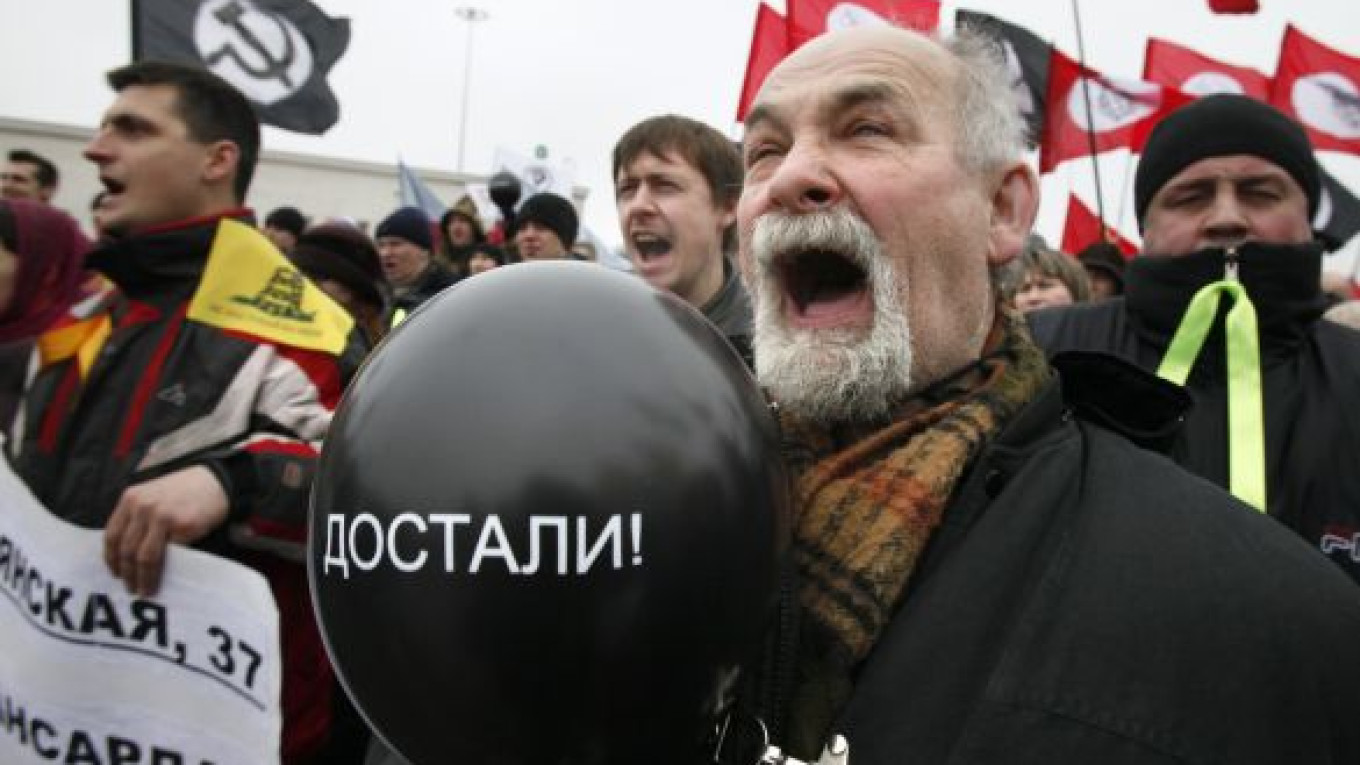About 20,000 protesters denounced government policies and called for Prime Minister Vladimir Putin to resign at dozens of rallies over the weekend, organizers said Sunday, far less than the tens of thousands of people they had hoped to attract.
Opposition groups had hoped for a large turnout that would increase the pressure on the government after they attracted 12,000 people to a Kaliningrad rally in January that rattled the federal authorities.
But only small crowds showed up for Saturday's so-called "Day of Wrath" protests in about 50 cities, stretching from Kaliningrad on Russia's westernmost edge to Vladivostok on the Pacific coast.
In Kaliningrad, about 5,000 people held tangerines in outstretched hands, chanting for Kremlin-appointed Governor Georgy Boos and Putin to resign, Solidarity leader Vladimir Milov said. Protesters chose tangerines instead of posters to prevent a police crackdown on the unsanctioned rally, he said. The tangerines also symbolized Boos, and protesters were supposed to crush them afterward.
YouTube footage of the rally showed some protesters wearing facemasks to symbolize a lack of freedom of speech.
Local authorities, who had authorized the January rally, refused to grant permission for Saturday's protest, citing a scheduled agriculture fair. But police officers made no effort to break up the event.
Plans for the protest prompted Boos to hold talks last week with a local opposition leader, Konstantin Doroshok, who heads Solidarity's Kaliningrad branch. Boos agreed to hold a televised call-in show to answer residents' questions, and Doroshok promised to cancel Saturday's demonstration.
The call-in show was held Saturday and lasted about four hours. But Solidarity's main office said the rally would be held because Doroshok had made the promise without its approval.
Solidarity leaders Milov and Alexander Rylkin flew to Kaliningrad to take part in the protest but were detained on arrival on suspicion of robbery, Milov wrote in his LiveJournal blog Sunday. The two were released before the rally.
"We were assured that the rebellious spirit is still strong in the city," Milov said.
In Moscow, several hundred people gathered for an unsanctioned protest on Pushkin Square that was broken up by police. About 60 people were detained, the opposition said.
Larger protests were held in Vladivostok and Irkutsk.
More than 2,000 people showed up for the rally in Vladivostok, which local authorities initially banned but later authorized, Solidarity said in a statement.
A similar number of people rallied in Irkutsk, where United Russia mayoral candidate Sergei Serebrennikov lost to Viktor Kondrashov, who was nominated by the Communist Party, in March 14 elections. Many of the protesters decried Putin's approval of the reopening of the region's Baikalsk Paper and Pulp Mills, which will dump waste into Lake Baikal, the world's largest freshwater lake.
Six people were detained, local news agencies reported.
The federal government and the main television channels, which are all state-controlled, ignored the rallies.
The Interior Ministry said ahead of the rallies that it would deploy 5,000 police officers nationwide to oversee them.
State Duma Speaker Boris Gryzlov said Friday that the rallies were funded by unspecified foreign powers. He said the money was being channeled through nongovernmental organizations and being used to pay people to participate in the rallies.
“Here we get the taste of a color revolution,” he said in an online interview with Gazeta.ru, referring to the nonviolent public protests that led to regime changes in Georgia in 2003 and in Ukraine in 2004.
Putin and other senior government officials have made similar claims in the past and heralded legislation through the Duma aimed at preventing NGOs from using foreign funds for political purposes.
Gryzlov on Friday also acknowledged that people were upset about increasing costs for housing and public utilities.
A recent poll by the Public Opinion Foundation indicated that about 30 percent of Russians were ready to take to the streets to protest.
Alexei Titkov, a regions analyst at the Institute of Regional Politics, suggested that the weekend protests might have failed to match organizers' expectations because people had just had a chance to show their discontent at regional elections March 14.
"This could be a lull after last week's elections, when those with a desire to express their disagreement could go to the polls," Titkov said.
United Russia swept the elections but lost several constituencies, including the mayoral seat in Irkutsk. In the last regional elections, in October, United Russia won every constituency, triggering widespread complaints of fraud, including by the Communists, the Liberal Democratic Party and A Just Russia. While the Communists participated in the weekend protests, the Liberal Democratic Party and A Just Russia did not.
Meanwhile, the Other Russia opposition group will stage an anti-government rally in Moscow on March 31, even if the authorities ban it again, leader Eduard Limonov said.
Opposition and human rights groups have tried to hold rallies on the 31st of each month to call for freedom of assembly as provided by the 31st Article of the Constitution. Moscow authorities have never authorized the rallies.


